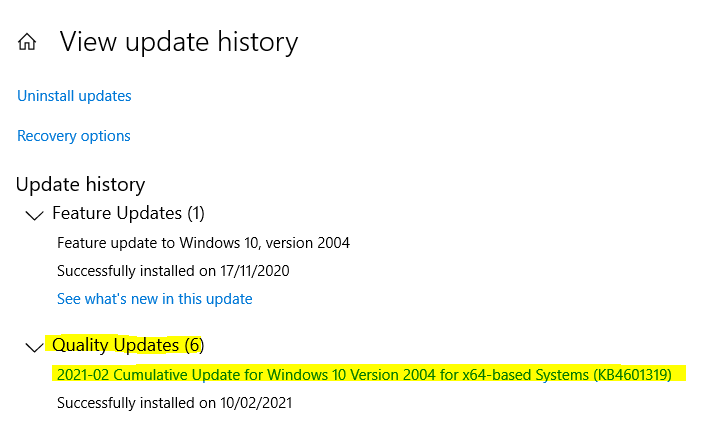I’ve noticed a click and drag delay/slowness,(not sure how to describe it) yes, but that started a while ago. Also that doesn’t hurt the rest of the functionality of the software so I’ve kind of written it off…
Missed that in the original post apologies.
Do you have a link you could share?
Not a problem, just wanted to clarify that I really couldn’t see any hardware or networking reason for this slowness so anyone reading later will notice this appears to be just a software issue, thanks Microsoft… lol
i have the exact same problem mate, still working with my IT specialist and opened a case with Epicor, the slowness is disturbing all users
The tool is EASY to use… but getting it was difficult.
This is the Microsoft site about it… Windows Update: FAQ - Microsoft Support
Their download links don’t work so I had to get it from here.
Once you run the tool, follow the prompts, it will search for updates, (this has to be done after uninstalling the offending update) and then you check the list and pick the one you want to hide, and voila done. This used to be part of the windows update tool but I don’t know why they got rid of it. Now when you search for updates, it typically installs them immediately and you can’t opt out from there.
Seriously look into removing KB4601319 and blocking it… it’s crazy how much it hinders performance.
i understand that mate, but our IT specialist and I am not happy about this solution, it is not practical nor efficient to keep uninstall windows updates specially on client PC’s
Another thing I wanted to mention was WSUS. If you are using that in you environment you can approve all your updates before they get rolled out. Probably better for bigger environments as there is a bit of config to do and of course, having the time to test the updates as they are released.
A.Baeisa, I agree, I’m all of IT at this facility, but nothing else will resolve the issue at hand, so it’s deal with the problem or remove the update. I run an environment that has to comply with ITAR and NIST 800-171 regulations and removing something like that is not detrimental, as long as your own procedures don’t back you into a corner requiring you to keep your machines updated to the min of release(typically something that is impossible anyways).
The only other solution is to figure out what part of epicor this is not happy with and Epicor has to come out with a patch. Me being on 10.2.400 isn’t a likely solution, they will suggest going to .500 or .600 or even .700 but there is no guarantee that those updates resolve this issue either.
Regarding WSUS, been there, done that, more of a headache than it’s worth when you’re a one man show. I also don’t have the physical resources anymore to run that application.
agree with you pal, i am a one man show in the company myself - only calling the IT specialist when needed- and i am on the same epicor version as well 10.2.400.10, but i think it is better to report/document that with epicor/windows so issue will be known and may be developers on both sides will be extra careful next time.
Agreed on the reporting, but in the mean time you shouldn’t have to continue to use the system with that faulty update installed. No where in security practices is that outlined as a best practice. If updates cause a probably they are typically reversed and that’s normal practice until the issue at hand is resolved. I will be reporting this to Microsoft when I can, but it will be tough to really articulate what the issue is since we don’t know what part of the update is causing this response time delay. As always though, I’m sure Microsoft will blame Epicor, and vice versa. 
already discussing this with the IT guy, and he said that he hope that the next update patch might solve the issue, as the server is down for full maintenance on this Friday, if this does not solve it, then we will be forced to apply your solution.
I previously mention specific KB’s and found that the KB number does not matter, it is any 2021-02 Cumulative Update that is causing the issue. We have rolled back all of our client PC’s and they are working fine now.
Next patch that would overrule this one would be the 3/2021 update… that’s a while to wait this one out. Best of luck… hopefully 3/2021 doesn’t just re-break my environment… lol
I’m up to 5-6 machines and all I’m doing is removing KB4601319 and every one has reported a major increase in speed… So I’m banking it on that KB. 
Client PC’s are even worse as users are using different app’s for different tasks in their PC’s (Engineering/Quality/Dispatching) and every app has its own OS/Updates recommendations, so how you will deal with that ? we can not allocate specific PC for each user to use Epicor
The update in question for me is a single W10 security patch and it doesn’t change for any other client PC. The locally installed software doesn’t change it’s requirements to need this update any more than any other PC, so until I know the issue is resolved, I’ll be hiding the update.
All I’m changing is client PC’s. I have not checked or removed this update on the server. Also server performance has not been hindered yet.
Edit * KB4601318 is the equal 2/2021 update that is applied to Server 2016 and is not slowing down Epicor locally on the server itself.
